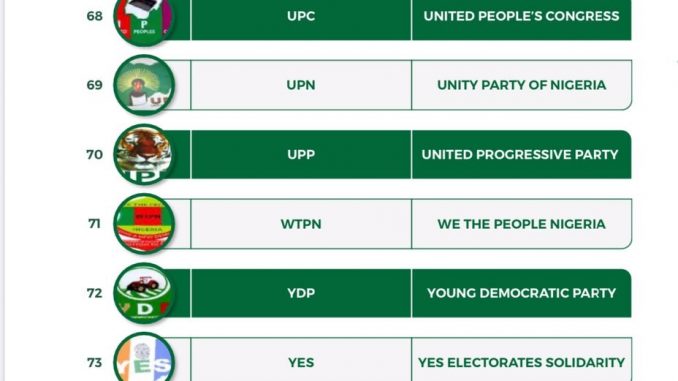The National Electoral Commission (INEC) on Thursday deregistered 74 out of 92 registered political parties in the country.
Announcing the de-registration in a press briefing in Abuja, INEC Chairman, Prof. Mahmood Yakubu said they were deregistered for their inability to fulfil requirements for an existence based on Section 225A of the 1999 Constitution (as amended).
He recalled that prior to the 2019 general election, Nigeria had 91 political parties while one more party was registered by court order after the election, making a total of 92 political parties.
Yakubu said that the 1999 Constitution (as amended) vests in INEC, the power to register and regulate activities of political parties.
He also recalled that in 2018, the Constitution was amended.
“In addition to the extant provision for the registration of political parties, the Fourth Alteration to the Constitution (Section 225A) empowers the Commission to deregister political parties.”
Yakubu said that in order to implement the provision of the Fourth Alteration to the Constitution, the commission carried out an assessment of political parties to determine compliance with the requirements for their registration.
He said that similarly, following the conclusion of the 2019 general election, including court-ordered re-run elections arising from litigations, the commission was able to determine the performance of political parties in the elections.
Yakubu said that in addition, the parties were also assessed on the basis of their performance in the Area Council elections in the Federal Capital Territory (FCT) the only Local Government elections which INEC was empowered to conduct.
He said consequently, the commission had determined that 16 political parties fulfilled the requirements for existence based on Section 225A of the 1999 Constitution, while 75 parties did not satisfy the requirements of the fourth alteration to the constitution.
“However, one of the political parties, the Action Peoples Party (APP) filed a suit in court and obtained an order restraining the commission from deregistering it.
“The party remains registered pending the determination of the case by the court.
“The new political party, Boot Party (BP) registered by court order after the 2019 general election will also continue to exist.
“Accordingly, 74 political parties are hereby deregistered. With this development, Nigeria now has 18 registered political parties,” Yakubu said.
Yakubu recalled that based on this provision, the commission, between 2011 and 2013, deregistered 39 political parties.
“However, several of the parties challenged the power of INEC to deregister them, particularly on the grounds that the Electoral Act is inferior to the constitution and that deregistration infringed their fundamental rights under the same constitution.
“Subsequently, the courts ordered the commission to reinstate the parties.
“It was for this reason that the National Assembly amended the Constitution to empower the commission to deregister political parties on the following grounds:
“Breach of any of the requirements for registration as a political party.
“Failure to win at least 25 per cent of the votes cast in one State of the Federation in a Presidential election or 25 per cent of the votes cast in one Local Government Area of a State in a Governorship election.
“Failure to win at least one ward in a Chairmanship election, one seat in the National or State Assembly election or one seat in a Councillorship election.”
The 16 parties that scaled through were Accord Party (A), Action Alliance (AA) African Action Congress (AAC) African Democratic Congress (ADC) African Democratic Party (ADP) All Progressives Congress (APC) All Progressives Grand Alliance (APGA) and Allied Peoples Movement (APM).
Other parties which also met the requirement were, Labour Party (LP) New Nigeria Peoples Party (NNPP), National Rescue Movement (NRM) Peoples Democratic Party (PDP) Peoples Redemption Party (PRP) Social Democratic Party (SDP) Young Progressive Party (YPP) and Zenith Labour Party (ZLP).
The deregistered parties included Alliance National Party (ANP) Abundant Nigeria Renewal Party (ANRP) African Peoples Alliance (APA) Better Nigeria Progressive Party (BNPP) Fresh Democratic Party (FRESH), Hope Democratic Party (HDP) and Nigeria Community Movement Party (NCMP).
Others included National Unity Party (NUP), Peoples Coalition Party (PCP), Peoples For Democratic Change (PDC), Peoples Trust (PT), Reform and Advancement Party (RAP), United Democratic Party (UDP), Unity Party Of Nigeria (UPN) and United Progressive Party (UPP)




 Premier League
Premier League